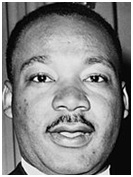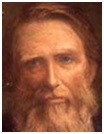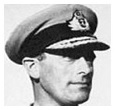|
 |
|
 |
|
|
||
Mahatma ( Mohandas) Gandhi - Philosophy and Leadership
Mahatma ( Mohandas) Gandhi (1869-1948)
Successfully ended British rule in India through non-violent action(pictured right). Much respected worldwide and inspired Martin Luther King’s (pictured right below) non-violent fight against racism in America. Born Mohandas, Gandhi was re-named Mahatma, meaning the great soul. Killed by a Hindu fanatic.
Why was he a great leader?
1. Non-violent, civil resistance (satyagraha) He change people's hearts by:
a) peacefully and selflessly disobeying unjust laws (like racism and British rule in India) . b) fighting violence with love Because violence leads to more violence. Or, as Gandhi put it: “An eye for an eye will make the whole world blind”.
2. Self-improvement He was always trying to become a better person through: a) self-examination “Turn the spotlight inward”, he advised i.e. look inside yourself and find wisdom. Gandhi:
His biggest weakness was his domination (sometimes cruel) of others, including his wife and children.
b) self-discipline He never did something wrong again, particularly after seeing how upset his father was after confessing to helping steal gold from his brother’s armlet. c) sacrifice He gave selfless devotion to others, particularly the poor and disadvantaged. His aim was “desirelessless”, resisting temptation and the love of material possessions. After the birth of his children, he chose to be celibate.
d) equanimity He treated success and failure the same. e) reflection and tranquillity He did nothing without prayer and criticized the speed of modern life. He span wool to
f) love He lived for others and fought hatred with love (see point 1).
g) honesty He hated telling lies.
3. Devotion to truth, wisdom and learning Why was he so wise?
a) great love of learning and wisdom His life’s ambition was to:
His Hindu religion came first, even before India.
b) open to other people’s ideas He accepted other people’s religions like Christianity, and learned from them. He was inspired by:
c) action after reflection He thought about solutions to people’s problems and then put them into action.
d) duty “Rights that do not flow from duty well performed are not worth having”, Gandhi said.
e) love of God He believed that God isn’t a person but represents the eternal principles of truth, love and purity of heart.
4. Courage He was extremely courageous, successfully using non-violent resistance against
a) racism in South Africa (where in 1894 he was beaten up by the white driver of a stagecoach, because he wouldn’t give up his seat for a white passenger, as the law then required). b) British rule in India For example, he organized:
5. Inspiration He inspired people by
He believed that change will only happen, if people change their attitudes.
6. Respect and reconciliation He encouraged Indians to:
His biggest disappointment was his failure to unite India’s Hindus and Muslims (who left to form Pakistan). 7. Humility and integrity Gandhi's humility and integrity won people’s respect, including his political opponents like:
In prison he made Smuts a pair of sandals which he wore with great affection.
8. Purpose He dedicated his life to:
He wanted to destroy what he described as the seven social sins: “Politics without principle, wealth without work, pleasure without conscience, knowledge without character, commerce without morality, science without humanity and worship without sacrifice”.
He received great support from:
Key quote on change We need to be the change we wish to see in the world.
Key quote on success Live as if you were to die tomorrow. Learn as if you were to live forever.
Key quote on leadership and management Power based on love is a thousand times more effective and permanent than power derived from fear of punishment.
Key quotes on love The best way to find yourself is to lose yourself in the service of others. An eye for an eye will make the whole world blind.
Key quote on customers A customer...is not an interruption in our work. He is the purpose of it. He is not an outsider in our business. He is part of it.
Key quote on nature and climate change Earth provides enough to satisfy every man’s need but not every man’s greed.
Key quote on God and religion God is conscience.
Key quote on business ethics Organizations, like men, if they are to command respect and grow, must have a sense of honour and must fulfil their promises.
Key quote on society A nation’s culture resides in the hearts and in the soul of its people.
Key quote on fear and anxiety Fear kills the soul.
Key quote on influencing people Truth never damages a cause that is just.
Key quote on careers A burning passion coupled with absolute detachment is the key to all success.
Key quotes on ethics Rights that do not flow from duty well performed are not worth having. Non-co-operation with evil is as much a duty as is co-operation with good.
Key quote on stress and peace of mind There is more to life than increasing its speed.
Key quote on peace of mind Turn the spotlight inward. |
|
|
||
|
|
||
| Copyright © wisdomtowin.com 2025 All Rights Reserved | ||
|



















